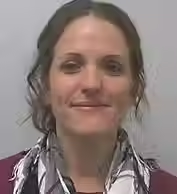
Meet the ISOS Executive Board
A six-member Executive for managing ISOS is elected by the ISOS members for a term of 3 years. The members of the Executive communicate with each other via online meetings and email. Members of ISOS may login onto the website to access documents and information, and to have discussions and meetings. Members may follow all the actions of ISOS, as well as take part in decision making through Google Groups. Membership is open to people and organisations interested in occupational science research and education, and those who support the promotion of occupation for health and community development. If you are interested in becoming a member of ISOS, please visit the section Becoming a Member. You can find information about the current ISOS Executive Board Members for year 2025-2026 below:
Cassandre Lavigne
ISOS Logistics and Events Lead

Michael Sy
ISOS Chair
Michael Sy is a licensed occupational therapist (Philippines), occupational scientist, and health professions educator. He is a Senior Researcher at the Institute of Occupational Therapy, Zurich University of Applied Sciences (Switzerland), with research interests in occupational science, occupational justice, emerging fields in occupational therapy, and interprofessional education. Michael's work spans international contexts through grant acquisition, publication, and knowledge dissemination. He is a pilot member of the Special Interest Group for Occupational Science (Philippine Academy of Occupational Therapists) and contributes to local OS projects. Michael also collaborates informally with Southeast Asian occupational therapists to reorganize the Asian Community for the Promotion of Occupation (ACPO). Committed to the International Society for Occupational Science (ISOS), he promotes global occupational science by facilitating regional dialogues and fostering collaborations that aim to transform society through occupations. For more details, visit his website: www.drmikesyot.com.

Rodolfo Morrison
ISOS Chair Elect
Rodolfo Morrison is the former Director of the Department of Occupational Therapy and Occupational Science at the University of Chile and president of Chilean Society of Occupational Science. He has a degree in Occupational Sciences and an Occupational Therapist from the Austral University of Chile; and Master and Doctor in Logic and Philosophy of Science from the University of Salamanca. In addition, he completed a postgraduate degree in Science, Technology and Society at the Center for Human and Social Sciences of the Higher Council for Scientific Research (CCHS-CSIC) of Spain. His areas of work have focused on the analysis of the history and epistemological currents present in Occupational Therapy and Science, in particular, in the incidence of classical pragmatism in the profession. Other areas of interest for him are feminist studies of science, studies on sexual diversity, occupational science and the uses of body techniques and meditation as therapeutic intervention tools.

Liesl Peters
ISOS Secretary and Adminisration
Liesl Peters is an occupational therapist and academic with over 15 years of experience in community development in South Africa. Her work focuses on socially-transformative occupational science, aimed at addressing real community needs. Liesl has co-developed the Occupation-based Community Development (ObCD) framework, which promotes a decolonial, justice-oriented approach to practice, and is used by occupational and speech-language therapists in Cape Town. She believes occupational science holds great potential but needs to better position itself to serve global and local communities. Liesl is committed to the strategic growth and positioning of occupational science, with a focus on transdisciplinary collaboration and innovative leadership, especially through organizations like the International Society for Occupational Science (ISOS). Her work, co-generated with communities and colleagues, offers valuable insights for advancing the discipline and transforming society.

Cassandre Lavigne is currently a PhD student in philosophy, with a concentration in applied ethics at the Université du Québec à Trois-Rivières, under the co-direction of Marie-Josée Drolet and Naïma Hamrouni. an occupational therapist (licensed in France licence). She obtained her occupational therapy's state diploma (French Licence) and her Master of Science in public health research from the Université de Limoges (France). Her research interests include occupational identity, and the various forms of occupational and structural injustices, more specifically from a humanist, intersectional and feminist perspective.

Josie Jarvis
ISOS Social Media and Website Lead
Josephine Jarvis (PP-OTD, MA-OTR/L) is an occupational therapist and an occupational science advocate. Since 2020, Josie's doctoral work has aimed to increase clinician literacy in occupational science. She created the free online course Foundations of Occupational Science for US-Based OTPs, along with the OS 101 Guide and the Evolved Living Podcast. You can explore my work at https://engage.evolvedlivingnetwork.com/.
Josie has collaborated internationally, including with AOTA’s Executive Board and President Alyson Stover, organizing over a dozen community outreach events. As Washington Occupational Therapy Association’s membership chair, she also developed their first self-hosted virtual CEU conference with a focus on OS knowledge. Josie's goal with ISOS is to expand access to occupational science through global, interdisciplinary outreach and online events.

Veselin Medenica
ISOS Membership Lead
Veselin Medenica is an Associate Professor of Occupational Therapy at the College for Human Development. A special educator-rehabilitator with expertise in Eastern European defectology (somatopedia), he served as the Head of the Department of Occupational Therapy until 2024, where he introduced the course "Occupational Science," bridging academic theory with practical application.
His professional interests include applied neuroscience, neuropsychology, biomechanics, assistive technologies, and artificial intelligence, particularly in their impact on occupational performance. Veselin holds a master’s degree in neuroscience (specializing in neuropsychology) and his doctoral research focused on limb apraxia and its relationship to ADLs, quality of life, and social participation in individuals with multiple sclerosis.
Having engaged with both Eastern and Western approaches to disability and occupation, Veselin advocates for the recognition of the shared foundations between Eastern European clinical defectology and occupational therapy, emphasizing their alignment with Occupational Science.





